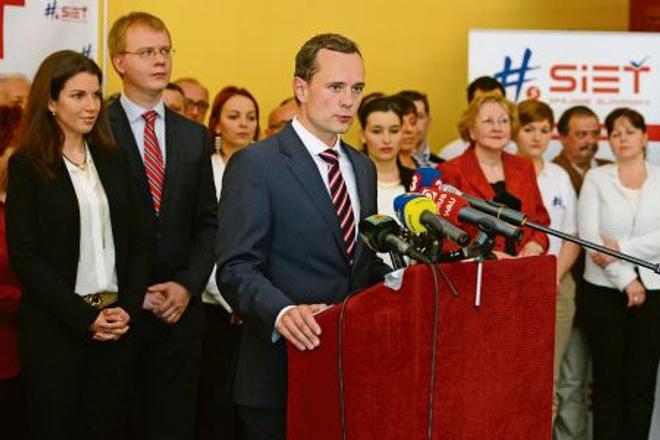THE POPULARITY of Radoslav Procházka remains high almost two months after he dropped out of the presidential election. The first opinion poll after his newly formed party announced its name and platform shows it among those with the strongest voter support.
If parliamentary elections were held at the turn of April and May, Radoslav Procházka’s new party Sieť (which translates to “network”) would come second after the ruling Smer party, according to Polis polling agency’s survey of 1,250 people released on May 6.
Sieť garnered the support of 11.4 percent of respondents. Procházka received over 20 percent of the vote in the mid-March presidential election, with the turnout of some 43 percent of voters.
Procházka presented his new party, Sieť, on April 26, and announced that it will compete in autumn’s municipal elections.
Polis head Ján Baránek noted that the good result of the new party would have to be confirmed by further polls to make sure that the current result is not just leftover from Procházka’s support in the presidential elections.
“But it turns out that a generational change is taking place in politics,” Baránek told the Sme daily. “People have lost patience with the traditional rightist parties.”
Most-Híd received 7.9 percent of the vote, while the Christian Democratic Movement (KDH) would garner the support of 7 percent of voters, according to the poll results, just after Ordinary People and Independent Personalities (OĽaNO), which would gather 7.7 percent of the vote. The non-parliamentary Party of Hungarian Community (SMK) would get 6.3 percent of the vote. The Slovak Democratic and Christian Union (SDKÚ) would just make it into parliament with 5 percent of the vote.
The ruling Smer party was still far and away the leader with 38.3 percent of the vote.
Freedom and Solidarity (SaS) and the Slovak National Party (SNS) would not make it through the 5-percent threshold with 3.8 percent of the vote each, and NOVA would get just 2.9 percent of the vote. People’s Party-Our Slovakia would receive 1.9 percent of the vote and the Communist Party of Slovakia 1.8 percent.
According to the poll, 60 percent of respondents would participate in the elections, while 22 percent would not vote and 18 percent were undecided.
Fico most trusted
Apart from party preferences, Polis also asked those polled about their idea of who the leader of the centre-right is. Radoslav Procházka topped the score on the right side of the spectrum, with 22 percent of those polled saying they believed him to be the leader.
He is followed by Béla Bugár of Most-Híd with 12 percent and Ján Figeľ of KDH with 9 percent, Sme reported.
Polis also asked respondents which politician they think is the most trustworthy. The list is topped by Prime Minister Robert Fico, supported by 26.1 percent of respondents, followed by Procházka with 21.5 percent and president-elect Andrej Kiska with 13.5 percent.
Top politicians also include Bugár (11.9 percent), Interior Minister Robert Kaliňák (9.2 percent), Foreign Minister Miroslav Lajčák (6.2 percent) and President Ivan Gašparovič (6.1 percent), the SITA newswire reported.


